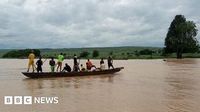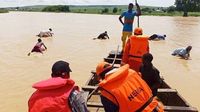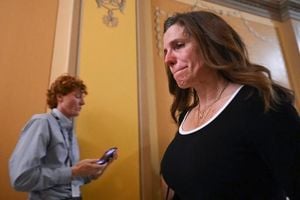On the morning of September 2, 2025, tragedy struck the tranquil waters of Nigeria’s north-central Niger State. A boat, crowded with more than 100 passengers, departed from Tungan Sule in Malale district, bound for the town of Dugga. The journey, intended as a condolence visit to honor a recently deceased community member, ended in disaster when the vessel struck a submerged tree stump near the Gausawa community in the Borgu Local Government Area. Within moments, what began as a communal act of mourning turned into a frantic struggle for survival.
According to multiple reports from Reuters, BBC, and the Associated Press, the accident occurred around 11 a.m. local time. The overloaded boat, carrying men, women, and children, capsized as it collided with the hidden obstacle. Abdullahi Baba Ara, chair of Borgu Local Government Area, told Reuters, "The death toll of the boat incident has risen to 60. Ten people have been found in serious condition, and many are still being sought." Initial confusion surrounded the precise number of passengers and casualties, but as rescue operations pressed on, the grim tally of victims continued to rise.
Emergency responders, local divers, and villagers rushed to the scene, hoping against hope to find survivors. Sa’adu Inuwa Muhammad, the district head of Shagumi, was among the first on site. He described the heartbreaking scene to Reuters: "I was at the scene yesterday around 12 p.m. until 4 p.m. The boat carried more than 100 people. We were able to recover 31 corpses from the river. The boat was also recovered and removed." Four victims were buried later that day in accordance with Islamic rites, a somber ritual repeated far too often in Nigeria’s riverine communities.
The Niger State Emergency Management Agency (NSEMA) confirmed to local outlets and the BBC that 29 deaths had been officially recorded, with 50 people rescued and two still missing. However, all authorities acknowledged that the toll was likely to rise as more bodies were recovered. Women and children made up the majority of the deceased, a devastating blow to families and the wider community.
For those who survived, the ordeal was harrowing. Ten people were reported in serious condition, and the search for the missing continued for days. Hussaini Isah of Nigeria’s National Emergency Management Agency (NEMA) told ABC News, "So far, 31 bodies have been recovered and 50 people rescued, while search and rescue operations continue for the missing." The full extent of the loss may never be precisely known, as rivers in this region can conceal victims for days or even weeks.
Boat accidents like this one are tragically common in Nigeria, especially during the rainy season, which stretches from March to October. Swollen rivers and lakes, combined with lax safety enforcement, overcrowding, and poorly maintained vessels, create a deadly mix. Analysts and local officials have repeatedly pointed to systemic problems. According to the Associated Press, vessels often operate without life jackets, and safety rules are frequently ignored. In fact, just last month, more than 40 people went missing after a similar boat accident in Sokoto state, also blamed on overloading.
The government has long recognized the dangers. Earlier in 2025, Nigeria’s Minister of Marine and Blue Economy, Adegboyega Oyetola, established a "Special Committee on the Prevention of Boat Mishaps in Nigeria." In May, the ministry distributed 42,000 life jackets across 12 riverine states in an attempt to enforce safety measures. The National Inland Water Ways Authority (NIWA) also launched public campaigns in Niger and Kwara states with slogans like "No Life Jacket, No Travel" and "No Night Travelling." Yet, as BBC’s coverage highlighted, these efforts often fall short on the ground. Abdullahi Baba Ara noted, "Perhaps the water marshals were not on duty when this boat took off," underscoring the persistent gaps in enforcement.
Niger State, Nigeria’s largest by land mass, relies heavily on water transport. For many, boats are the fastest and cheapest way to travel between remote communities, especially when roads are impassable during the rainy season. The journey from Tungan Sule to Dugga is a common one, and for the families aboard the ill-fated vessel, it was a routine trip marred by tragedy. The majority of the victims—women and children—were simply trying to pay their respects, a poignant reminder of how everyday life in these regions is shadowed by risk.
Officials have promised a thorough investigation into the causes of the accident. The Niger State Emergency Management Agency said it would examine compliance with safety rules and whether operators had ignored warnings about high water levels. The boat’s overloading and collision with the tree stump were cited as the immediate causes, but underlying issues of regulation and enforcement loom large. According to Reuters, the agency confirmed, "The boat was overloaded and collided with a tree stump, causing it to capsize."
Boat operators in Nigeria face constant pressure to maximize earnings, often at the expense of safety. Passengers, too, may be reluctant to challenge dangerous practices, especially when alternative transportation is scarce or unaffordable. Despite government mandates requiring life jackets, enforcement is sporadic. As BBC reported, "About 25 people went missing last month after a boat accident in Sokoto state. In December last year, 54 bodies were recovered from the River Niger after a boat that may have been carrying more than 200 passengers capsized." These recurring tragedies highlight the urgent need for systemic change.
In the aftermath of the Borgu accident, grief and anger mingle in equal measure. Families mourn loved ones, while community leaders and officials call for renewed vigilance and accountability. The hope is that this latest disaster will not fade quietly into the background, but instead spur meaningful reform. As the rainy season continues and waterways remain busy, the risk of further accidents remains high unless safety measures are enforced with real commitment.
The story of the Borgu boat accident is, at its heart, a story of ordinary Nigerians navigating extraordinary risks. It’s a reminder of the fragility of life in communities where infrastructure is lacking and oversight is weak. Each lost life is a call to action, urging authorities and citizens alike to demand better—because no journey, no matter how routine, should end in such heartbreak.







